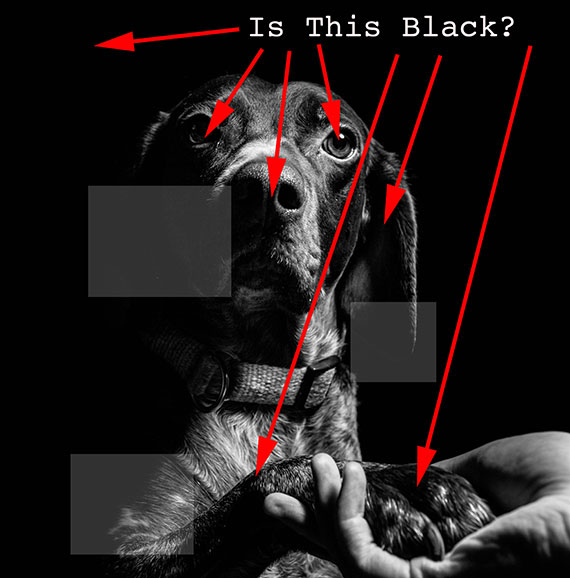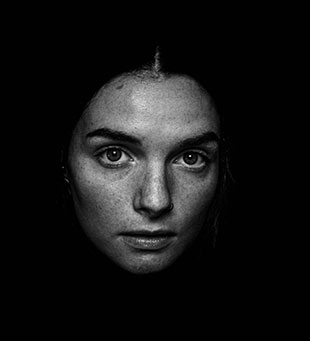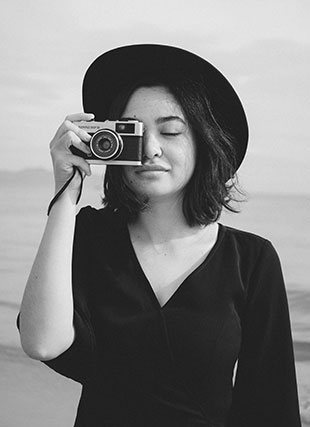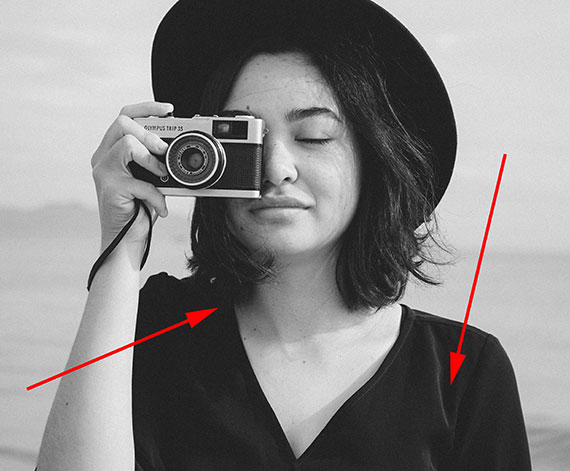This article is based on concepts from the Better B&W Photography Guide if you want to dig deeper for further training.
What is the color black?
It seems like that should be a relatively easy question to answer.
However, it’s not – especially when it comes to black and white photography.

Photo by Fabian Gieske (arrows and text put in by writer)
There are infinite shades of color and tone all around us.
Our brain, through the help of our eyes, categorizes and identifies each object that we view. We look at an object and say, “Oh, that’s black.”
The truth is that there are infinite shades and tones of the color black.
The cute picture of the dog illustrates this idea. What’s black in that picture?
Question
Are all of those points at the tip of the red arrows the color black?
Yes, they are, and that brings up a critical concept in black and white photography.
This concept is known as the Black Point.
If you take a moment and look at the three gray boxes in the puppy photo, you’ll see that there are areas of the dog’s ear, face, and leg that have disappeared into the background. They have quite literally melted away.
This can mean that the Black Point was not appropriately placed, and in this case, I would say that was true.

Photo by Quinten de Graaf
In this second example photo, the woman’s head, neck, and shoulders disappear into the background.
The difference is that in this case, it was intentional for effect.
Knowing how to place your Black Point is a valuable skill in photography (particularly for black and white photography)!
Let’s Define Black Point
The Black Point is the darkest and most dense black area of your photograph. On a histogram, it’s located to the very far left of the scale. When you read that area with an RGB eyedropper, it reads 0,0,0.

Photo by Huynh Tan Hau
This photograph is a superb example of a well-placed Black Point.
This woman is literally covered in black. Yet notice how you can see detail and texture in her blouse, hair, on the camera, and even under the hat.
Where is the Black Point in this picture?

Photo by Huynh Tan Hau (arrows put in by writer)
A well-placed Black Point is typically located in a non-significant shadow area within the frame.
Here’s your Quick Tip:
Black Point is vital to your photography, especially black and white photography, as it helps to ensure that you have a full range of tone within your picture!
You place the Black Point by carefully watching the histogram as you convert a digital color file to a black and white photograph. Once you’ve made the conversion, you can further fine tune the Black Point with the Adjustment Brush and/or the Lightroom sliders labeled Shadows and Blacks.
For Further Training:
Have you ever quickly converted your shots to black & white, hoping to make them “Better”? And the result was bland to say the least? This is a very common occurrence. Knowing how to convert color to B&W with a working understanding of tone and contrast in post-processing is a very different story. This in-depth eBook is designed to cover EVERYTHING you need to know about producing your own powerful and professional B&W images.
Every step is detailed in all three programs: Photoshop, Lightroom, & Elements. But even if you don’t have these applications, there’s enough information in here to help you achieve the same results with the software you already have. It is currently 76% off if you want to check it out.
Deal ending soon: The Better Black & White Photography Guide at 76% Off
Go to full article: Understanding Black Point for B&W Photography
What are your thoughts on this article? Join the discussion on Facebook
PictureCorrect subscribers can also learn more today with our #1 bestseller: The Photography Tutorial eBook
The post Understanding Black Point for B&W Photography appeared first on PictureCorrect.
from PictureCorrect https://ift.tt/307EM9U
via IFTTT







0 kommenttia:
Lähetä kommentti